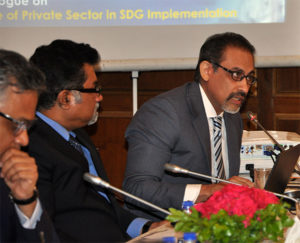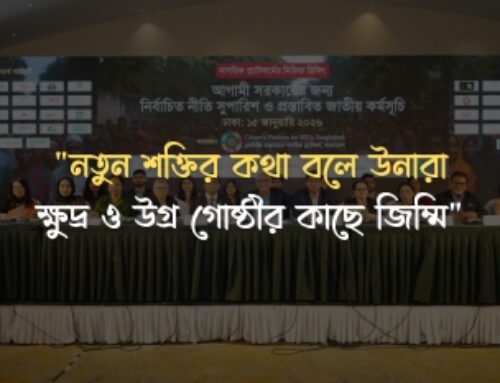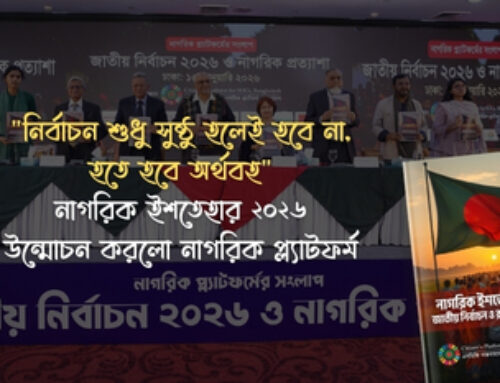The achievement of Bangladesh was remarkable in the Millennium Development Goals (MDGs) and following its trail the country will also be able to reach the Sustainable Development Goals (SDGs). Devising a Public-Private Planning Mechanism is a pre-requisite for the country to dive into the SDG implementation process. However, necessary research and study also need to be conducted to fit the private sector into the government’s initiative in this connection.
Such views emerged at the dialogue on “Role of Private Sector in SDG Implementation” organised jointly by the Citizen’s Platform for SDGs, Bangladesh and the Metropolitan Chamber of Commerce and Industry (MCCI) held at the MCCI Auditorium on 2 October 2016. The Centre Policy Dialogue (CPD) is the Secretariat of the Platform.
Mr Asif Ibrahim, Vice-Chairman, Newage Group and Former President of Dhaka Chamber of Commerce and Industry (DCCI) presented the keynote, titled The Role of Private Sector in Implementing Sustainable Development Goals (SDGs) in Bangladesh, at the dialogue. In his presentation Mr Ibrahim highlighted seven challenges towards SDG implementation for Bangladesh which are growing population; poverty and inequality;, unplanned urbanisation; energy insecurity; inefficient water resource management; and natural disaster and climate change. He emphasised on the necessity of introducing green-industry in the country and on devising strategy and effective mechanism to deal with the impacts of climate change, particularly, saving the endangered rivers.

Mr Ibrahim also noted that the private sector in Bangladesh is ready to support the government’s initiative to implement the SDGs. Now the government should develop a apparatus where the private sector can contribute in a systematic process by maintaining transparency and accountability.
In his introductory remarks, Dr Debapriya Bhattacharya, Convenor, Citizen’s Platform for SDGs, Bangladesh mentioned that generating public demand and awareness is a pre-requisite for the SDG implementation. Engaging all stakeholders and private sectors in this process requires a multi-faceted mechanism. In view of this the government needs to pursue an inclusive approach in its journey towards the SDG delivery process, he added.
Notable contribution in our national economy is being made by the country’s Small and Medium Entrepreneurs (SMEs) so that we have to ensure their participation in the implementation process as well, said Dr Bhattacharya. He recalled that while financing for the MDGs attainment, 82 per cent of the financial resources came from domestic sources. Similarly, during the implementation of the SDGs, the need for domestic resource mobilisation will be critical. He also stressed on developing a platform where the private sector can engage with the government in a more institutional manner.
 Mr M A Mannan, MP, Hon’ble State Minister for Finance and Planning, Government of Bangladesh, being present as the Chief Guest, noted that the government will develop a mechanism for ensuring effective partnership during SDG implementation. Drawing attention to the success in the MDGs, Mr Mannan expected that the country will be one of the pioneers in delivering the SDGs in the region again.
Mr M A Mannan, MP, Hon’ble State Minister for Finance and Planning, Government of Bangladesh, being present as the Chief Guest, noted that the government will develop a mechanism for ensuring effective partnership during SDG implementation. Drawing attention to the success in the MDGs, Mr Mannan expected that the country will be one of the pioneers in delivering the SDGs in the region again.
Mr Md Shafiul Islam (Mohiuddin), First Vice President, the Federation of Bangladesh Chambers of Commerce and Industry (FBCCI), while delivering his remarks as the Special Guest, noted that the political will and leadership are critical in achieving the SDGs. The private sector in this country has been very resilient at difficult times and provided adequate support to national economy. The sector will continue to support if the government extends its cooperation in this regard connection, he added.
As the Chair of the dialogue by Mr Syed Nasim Manzur, President, MCCI noted that the government should focus on effective resource mobilisation keeping in view the timely implementation of SDGs. He suggested the government to concentrate on fostering employment generation and decentralising the public administration. Successful delivery of the SDGs in timely manner will critically hinge upon the early realisation of these two catalysts, he added.
The dialogue was participated by trade leaders, entrepreneurs, bureaucrats, experts, economists, researchers, development practitioners, journalists among others.





